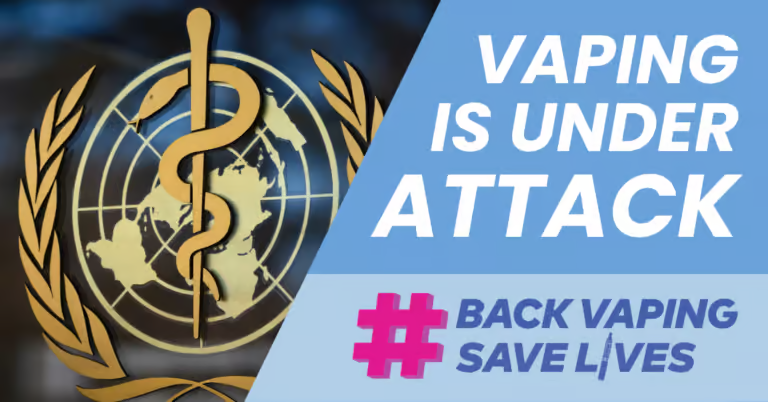
The World Health Organization (WHO) is threatening to ban vaping products in the upcoming FCTC conference in November. Let’s talk about what they want to ban and what you can do to help.
The tenth session of the Conference of the Parties (COP10) to the WHO Framework Convention on Tobacco Control (FCTC) will take place in Panama from the 20th to the 25th of November.
WHO has become increasingly aggressive in its crusade against vaping as of late, and their agenda for the conference foretells a brutal, misinformed attack—an attack on something proven to save lives that’s 95% safer than smoking cigarettes.
WHO wants to enact draconian measures to restrict access to vaping across the globe.
But if we’re loud enough, we can stop them. Read on for actionable steps you can take to support vaping.



What is the WHO trying to achieve at COP10?
WHO is intending to limit adult vaping across the globe in an attempt to restrict access to children. The organisation considers vapes a “tobacco product,” despite the fact that vapes contain no tobacco whatsoever and the only ingredient that vapes share with cigarettes is nicotine.
As of now, the FCTC effectively wants vaping and tobacco to be classed as the same product.
In the world of vaping, WHO wants to make an impact on flavour, choice, and cost—and all of their suggestions are poised to decimate the global vaping industry.

A Ban on All Vape Flavours (Except Tobacco)
Many smokers quit because they’re tired of smelling like smoke. And I don’t know about you, but when I made the transition to vaping, I found that passing through a cloud of someone else’s smoke on the street made me sick to my stomach.
It would be perverse to force ex-smokers to vape tobacco-flavoured vape products, full stop. But this is what WHO wants to achieve.
WHO has made it abundantly clear in the past that they see all flavours in electronic nicotine delivery systems (ENDS) as a threat to children. At a previous FCTC, they published a report encouraging “banning or restricting the use of flavours that appeal to minors” (Source). This includes all flavours besides tobacco.
Funny enough, WHO admits in the very same report that “Flavours also seem to play a role among adults and experienced ENDS/ENNDS users in helping migration away from tobacco.”

Redefining Smoking
WHO also claims that the word “smoke” can include vape clouds. What? These are categorically different substances. Smoke comes from something being burned. Combustion. Vapour is an aerosolised liquid.
This change in terminology is designed to make it easier for vapes to be classified alongside cigarettes as a tobacco product. That way, they can easily ban vaping alongside smoking in public and even private spaces. They can also then demonise vaping by making it seem just as dangerous as smoking.
WHO wants this despite the fact that we know that second-hand vapour or “passive vaping“ poses a minimal risk of harm to bystanders.

A Ban on Open-System Refillable Vapes
WHO suggests a ban on refillable vapes, because apparently, choice is a big no-no. The organisation believes that the ability to customise your vaping experience will enable users to “add unorthodox and illicit additives to their products.”
The WHO thinks these devices are open to abuse—and perhaps that’s true. But so are syringes and drinking glasses and whipped cream and telephone boxes and public restrooms. We don’t ban beneficial products to prevent a few bad actors from abusing them.
Open system vape kits reduce waste compared to disposable vapes, since they’re not discarded after a single use, and they also motivate more smokers to make the switch by offering an option they can customise to their liking.
If we ban refillable vapes, we’re opening up corridors for black market sales to take over. The regulatory systems the UK currently has in place—one chock-full of rules and red tape—may be cumbersome and misguided in parts, but it does the job of protecting vapers in the UK. We can’t jeopardise that to pacify the WHO.

Taxation at the Same Rate as Cigarettes
WHO believes that taxation at the same rate as cigarettes will deter minors from buying vapes. They’re wrong—because a majority of minors who vape source them illicitly, either online or through friends.
Instead, what will happen is that one of vaping’s biggest appeals for adult smokers—the savings it brings—will go down the toilet. Vapes would cost the same as cigarettes.
Experts estimate that a tax hike on vape products could cost the average vaper £2,000 more per year.
Outraged? So are we.
